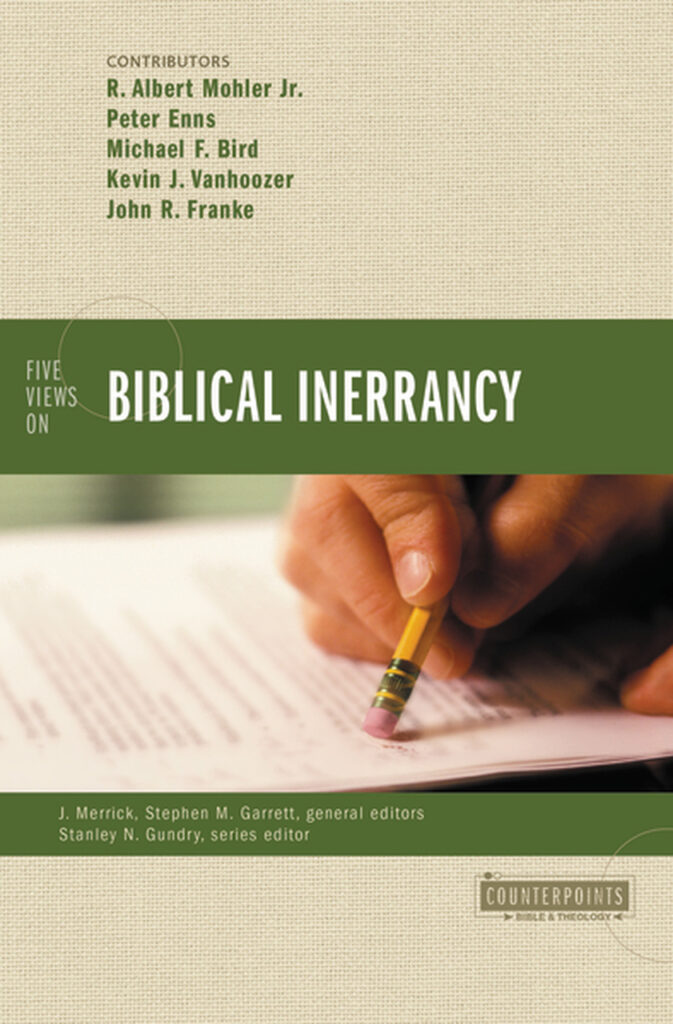Two years ago, when I joined the Evangelical Theological Society (ETS), I was required to affirm the inerrancy of Scripture. While I’m not a literalist or fundamentalist, I still willingly and whole-heartedly embrace the doctrine of inerrancy as essential to faith and practice (as upheld by CSBI). Not expedient for strained acceptance, but essential. I publicly confess that the truth of God’s word is inspired, inerrant, infallible, sufficient, reliable, authoritative, and clear from the intent of the biblical authors. I utterly delight in God’s word. As necessary for truth and reason, epistemic and existential knowledge of God through divine encounter is shaped by being conformed to Christ.
Yesterday I finished carefully and completely reading through Five Views of Biblical Inerrancy (about 325-pages). Sometimes I take notes and highlight areas of the book to fully ingest the meaning of the subject matter, which I did this time. Aside from my written work reviewing the material, I have numerous notes for continuing interest. To get the various perspectives from prominent members of three evangelical and two secular academic institutions, I’ve taken a macro and micro look at the different topics and perspectives it contains. The five participants came from scholars who wrote their essays as respected and influential people from Cambridge (Vanhoozer), Harvard (Enns), Oxford (Franke), Queensland University (Bird), and Southern Baptist Theological Seminary (Mohler). Each participant has a Ph.D., and all of them vary widely about the doctrine of inerrancy. While all five participants are self-identified evangelical, their distinctions are between conservative and liberal worldviews.
Franke and Enns would call evangelicalism to a postconservative society-centered way of faith and practice concerning interpretive and sapiential meaning. Conversely, Vanhoozer and Mohler have a God-centered view of faith and practice with a more objectively truth-based historical-grammatical approach to sapiential interpretation. While Bird appears somewhere in between the two pairs. Vanhoozer and Mohler embrace an authorial intent hermeneutic, while Bird does as well to a limited extent contingent upon validated merits of biblical meaning. While it isn’t apparent if Enns and Franke apply a reader-response form of interpretation, they both seem to advocate an altogether different categorization of interpretation for social utility. Enns and Franke are not hostile to truth. They are deconstructive of Truth in exchange for small t – truth.
The reading readily shows who subscribes to truth in relativistic terms and who wants to define it or redefine it to suit social interests for a plurality of cultural and missional outcomes. To the liberal worldview, Enns and Franke appear to subordinate evangelicalism as an instrument of society to satisfy and affirm a divergence of human interests. The others are more sensitive to the value and necessity of theological doctrines that arise from revelatory truth. Including the doctrine of inerrancy, but even further retroactive to other doctrines of the faith to reshape Christian thought, commitments, and trajectories. By inference, Enns (Harvard) and Franke (Oxford) have hyper-radical ideologies concerning Christianity and therefore do not fully accept the core tenets of the faith. Their departure from evangelicalism appears inevitable. Otherwise, what they profess is in contradiction to their beliefs and worldview.
All participants had much to say about the doctrine of inerrancy and the Chicago Statement of Biblical Inerrancy (CSBI). Those who were not U.S. citizens rejected the CSBI for various reasons, while it seems apparent there’s a not-invented-here (NIH) perspective at work. Some residents outside the U.S. can have a sense of resentment that the CSBI originated from American evangelicalism. If the statement were to become otherwise revised from a global (worldly) perspective, it would become shaped toward infalliblistic interpretation at best, while the doctrine of inerrancy would become surrendered entirely. While “progressive” or postliberal “Christians” decry colonialism or imperialistic export of Western or American foundations of theological doctrines, there is an oppositional posture toward Christ’s commission concerning the gospel and discipleship. Paul the Apostle, an Israelite Hebrew, originated cross-national mission work that spanned languages, cultures, time zones, historical religious commitments, and indigenous (Gentile) people groups to spread the gospel, plant churches, and develop the spiritual well-being of believers in Christ. He took absolute Truth to a harvest field of people for the Kingdom without liberal or “progressive” impediments. Instead, he faced cultural and philosophical opposition, much like we see among academics and scholars today. Particularly against the doctrine of inerrancy.
















